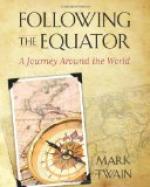Waitukurau. Twenty minutes for luncheon. With me sat my wife and daughter, and my manager, Mr. Carlyle Smythe. I sat at the head of the table, and could see the right-hand wall; the others had their backs to it. On that wall, at a good distance away, were a couple of framed pictures. I could not see them clearly, but from the groupings of the figures I fancied that they represented the killing of Napoleon III’s son by the Zulus in South Africa. I broke into the conversation, which was about poetry and cabbage and art, and said to my wife—
“Do you remember when the news came to Paris——”
“Of the killing of the Prince?”
(Those were the very words I had in my mind.) “Yes, but what Prince?”
“Napoleon. Lulu.”
“What made you think of that?”
“I don’t know.”
There was no collusion. She had not seen the pictures, and they had not been mentioned. She ought to have thought of some recent news that came to Paris, for we were but seven months from there and had been living there a couple of years when we started on this trip; but instead of that she thought of an incident of our brief sojourn in Paris of sixteen years before.
Here was a clear case of mental telegraphy; of mind-transference; of my mind telegraphing a thought into hers. How do I know? Because I telegraphed an error. For it turned out that the pictures did not represent the killing of Lulu at all, nor anything connected with Lulu. She had to get the error from my head—it existed nowhere else.
CHAPTER XXXV.
The Autocrat of Russia possesses more power than any
other man in the earth; but he cannot stop a sneeze.
—Pudd’nhead
Wilson’s New Calendar.
WAUGANIUI, December 3. A pleasant trip, yesterday, per Ballarat Fly. Four hours. I do not know the distance, but it must have been well along toward fifty miles. The Fly could have spun it out to eight hours and not discommoded me; for where there is comfort, and no need for hurry, speed is of no value—at least to me; and nothing that goes on wheels can be more comfortable, more satisfactory, than the New Zealand trains. Outside of America there are no cars that are so rationally devised. When you add the constant presence of charming scenery and the nearly constant absence of dust—well, if one is not content then, he ought to get out and walk. That would change his spirit, perhaps? I think so. At the end of an hour you would find him waiting humbly beside the track, and glad to be taken aboard again.
Much horseback riding, in and around this town; many comely girls in cool and pretty summer gowns; much Salvation Army; lots of Maoris; the faces and bodies of some of the old ones very tastefully frescoed. Maori Council House over the river-large, strong, carpeted from end to end with matting, and decorated with elaborate wood carvings, artistically executed. The Maoris were very polite.




